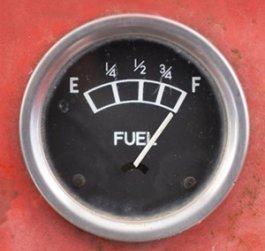The innovative folks at CoolPlanet BioFuels are going to help reverse climate change and make a killing doing it.
Start with part I if you didn’t just come from there.
CoolPlanet BioFuels’s Carbon-Negative Fuel
How does CoolPlanet make carbon negative fuel? Simple. If the biomass source has 100 units of carbon in it, the process makes 50 units of biofuel (gasoline or diesel in this case) and 50 units of what’s called biochar. The biofuel is combusted in your car or generator and releases those 50 units of carbon back into the atmosphere as CO2. The biochar is like charcoal and can be mixed in with topsoil on farmland to improve the soil quality without releasing the 50 units of carbon back into the atmosphere. There’s a good word to describe CoolPlanet’s solution: Elegant.
What about price? Here’s Mike’s answer: “We’re targeting costs at well under $1/gallon. We think we can do it for $0.60 to $0.70/gallon. But everyone else that we look at in the bio fuels industry is looking at hitting a $2/gallon. We think we’re going to cut that in half.” How can they possibly do that? Their technology avoids the pitfalls that previous biofuel companies have fallen into.
CoolPlanet’s Technology
The success of this entire venture rests on the technology and engineering developed by CoolPlanet. It’s also filled with trade secrets that I was not entitled to hear at the time of my interview with Rocke. But, I poked around a lot and got a lot of very important questions answered. With the information I had access to, my biggest concern was around scaling, and CoolPlanet has a great strategy for that as well.
Ultimately, the only way to know that the technology piece is legitimate is to see it firsthand. But if the claims are all true, CoolPlanet BioFuels is a company to keep an eye on. And, because Rocke was so willing to let me sign an NDA and see the whole process from start to finish, I have confidence in the future of the process and the company’s sustainability.
As you’ll see in the interview, I’m a bit concerned about how CoolPlanet will scale. Their modularized approach means they gain flexibility by bring their units right to the source of the biomass but that scaling the operation may be difficult. I raise these and other concerns and get some serious answers from Mike.
My on CoolPlanet BioFuels:
- The US economy (and most of the developed/developing world) runs on cheap energy. This cheap energy is currently way under-priced. It won’t be forever…
- As petroleum becomes harder to find and extract from the earth (and as global demand increases), the costs of gasoline, diesel, jet fuel, heating oil…etc will increase, shifting billions of dollars to new, more economic, sources of energy.
- CoolPlanet BioFuels set out to reverse global warming and is actually producing carbon negative fuel.
- They may face issues around pricing, regulation, and scaling. Their technological approach eliminates most of the issues that have killed previous bio-fuel companies and their current plans for scaling are smart.
From what I’ve seen so far, CoolPlanet BioFuels is the real deal. One day I hope to see the whole process and offer an even deeper perspective.
I’ll leave you with a great quote from Mike about CoolPlanet’s carbon negative fuel:
For every gallon of gasoline that we make, we’re making 5.5 pounds of solid biochar that then becomes a soil amendment. You know, if you burn the gasoline you get 20 pounds of CO2. And out of that 20 pounds of CO2 there’s around 5.5 pounds of carbon. So every gallon of gasoline that we make, we take out an equivalent amount of carbon and put it back into the ground to be sequestered. That’s why we’re n100. N100 means 100% carbon negative. So when we put this back in the ground, the more fuel you use, the cleaner the air gets. So I want people to drive a hummer. I want them to drive a ‘vette and use fuel. Because the more fuel you use, the cleaner the air gets. It’s a very contrarian solution.
Check out the full transcript here.
[Originally published By Andrew Bellay on aonetwork.com]

